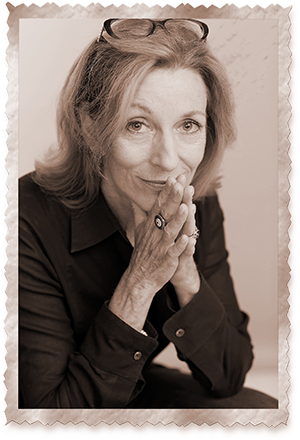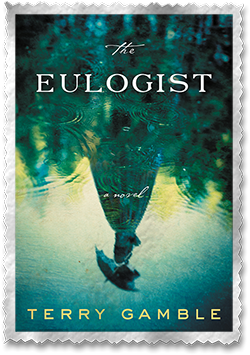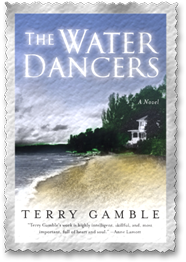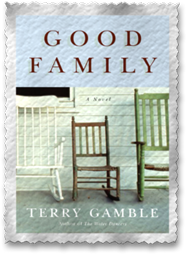
I was born in Pasadena, California—the younger of two daughters of resolutely Victorian parents. A strange, pale child, I spent most of my childhood under the piano or on a closet shelf reading books. The Secret Garden was a particular favorite, as was A Wrinkle in Time. Literature, I soon learned, was about transformation and transcendence—a cheap and relatively risk-free exit strategy to an otherwise tedious life. Thus, in fourth grade, I composed one of my first literary attempts: Bertha the Beetle—a four-page epic describing the picaresque encounters of an exoskeletal protagonist. I have always written. Encouraged early on by magnificent grade school teachers and, later, by equally magnificent high school teachers and college professors at The Colorado College and University of Michigan, I have found the greatest joy in the process of discovery through writing. As Ann Morrow Lindbergh wrote, “Writing is thinking. It is more than living, for it is being conscious of living.” |

Photo: Cristiana Ceppas
|
The Eulogist is set in Cincinnati, Ohio, where my ancestors landed when they emigrated from Northern Ireland in 1819. Choosing a topic for a novel-length work is like committing to a marriage. You expect to be together for a long time. You expect hardship as well as richness in the journey. The few times I’d been to Cincinnati — visiting family, doing a book reading, attending a friend’s wedding — I was intrigued by its sultry, Southern feel, by its evolution as an emerging city after the Revolutionary War and the acquisition of new territory, by its proximity to the river and the former slave state of Kentucky. My father’s family had emigrated from Northern Ireland in the early 19th C. and landed by chance in this city that was also known as Porkopolis. In the decade or more it took me to research and write, I was struck by the many issues from that time that mirrored those of today: immigration; religion; technology; race; class; women’s rights. The first iteration of the book began with bodies being exhumed from churchyards to be replanted in the cemetery at Spring Grove, just as my ancestors had been dug up and reinterred on a loftier site. Looking at their names on grave markers, I wondered — “Were they kind people? Intelligent? Scheming? Upright or dissipated? Did they condone slavery, shun it, or affect indifference?” For the most part, I’ll never know, but the family that came to me, particularly in the character of Olivia Givens, had a story to tell. Finishing a book feels less like the end of a marriage than having your children leave. You have watched your characters grow, suffered through their agonies, loved them, forgiven them, even learned from them. In that sense, every novel is a eulogy — a testimonial to our ghosts. more on the story behind The Eulogist here. |
 |
The Water Dancers, based on the area in Northern Michigan where six generations of my family have gone every summer, is my first novel. It took years to write, much of them spent in the Tassajara Café, now defunct. I had intended to write about Michigan, especially the little town of Harbor Springs which has had so many incarnations, starting with the Native Americans, on through the lumbermen and the fur trappers, the farmers, and, ultimately, the summer people. Summertime in a resort is like a stage set: the lighting just so, the props in place, yet all the while life is teeming backstage—invisible hands that pull the curtains and move the spots and arrange the costumes. Over the years, my central character became the Odawa girl, Rachel Winnappee, whose life was revealed to me through research and interviews, and whose challenges I can only imagine. The other main character in The Water Dancers is a World War II vet with an amputated leg and a morphine problem. The reality of this character—his frustrating estrangement from the life in which he was raised—resonated more closely with my experience as a child raised in the 60s and 70s when everyone was taking a hard look at America’s class and racial divisions. |
 |
|
This theme of estrangement and reconciliation led to my second book, Good Family, the genesis of which grew out of my own mother’s death. Her illness was protracted and devastating, but in the time she took to die, my sister and I deepened our relationship. There is a moment when siblings realize that going forward they have only each other, and sharing a streak of dark, sick humor doesn’t hurt. Seeing how my mother was transformed and comforted by the love and attention of her extended family, I knew there was a story. It may be an old story, but we boomers live with an underlying conviction of prima facie, or the notion that we are the first to experience any given event. Many of us in my generation seem stunned at our parents’ passing and the accompanying realization that we are, in fact, the grown-ups. As Maddie, the central character in Good Family, muses: “…it occurs to me that my father is really, truly dead, and that nothing I do now can affect him. I feel both bereft and liberated.” In the face of both my parent’s deaths, I felt chastened yet empowered. Recognition of mortality is at once sobering and exhilarating as it brings home the recognition that we have such little time.
“Terry Gamble is a gifted writer, elegant, precise, evocative, and humane. Her work is highly intelligent, skillful, and, most important, full of heart and soul. This is beautiful writing.” —Anne Lamott |
 |